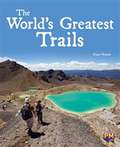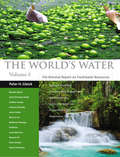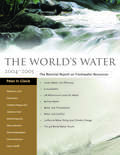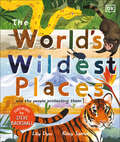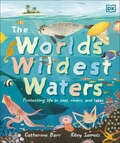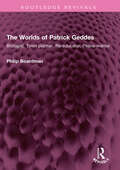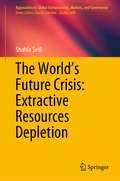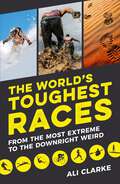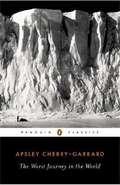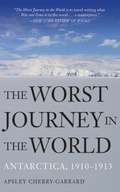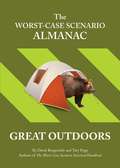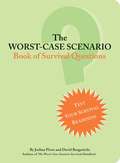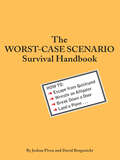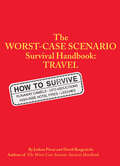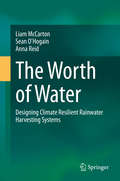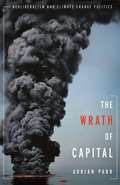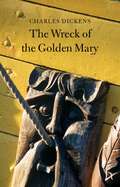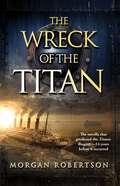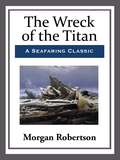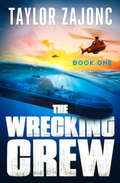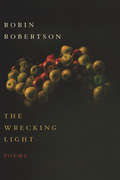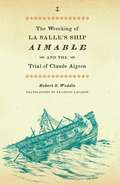- Table View
- List View
The World's Greatest Trails (Into Reading, Level P #56)
by Diana NoonanNIMAC-sourced textbook <p><p> Hiking is a pastime enjoyed by people all over the world. Many countries have hiking trails that are famous for their length, scenery, or wildlife. Read all about some of the world's greatest trails!
The World's Largest Plants: A Book About Trees
by Susan BlackabyHear the wind rustling through the maple? See the rings on the old tree trunk? Come along on a vivid introduction to the majestic giants of the plant world.
The World's Water
by Peter H. GleickAmong the most compelling environmental issues of today and tomorrow are those concerning the world's fresh water resources. Peter H. Gleick's important new volume, Water in Crisis, addresses the timely and sometimes controversial aspects of world water use. At stake are water quality, quantity, and possible future conflicts over shared international water resources. Nine essays by leading specialists from fields as diverse as hydrology, zoology, and law, among others, cover such issues as the status of developments in international water law; hydroelectric power; the possible effects of climatic change on water resources; and the state of fresh water fisheries. Particular chapters explore access to clean drinking water and sanitation; the use of water for energy and food production; the quality of rivers, lakes, and inland seas; and the condition of natural aquatic ecosystems. A joint project of the Pacific Institute and the Stockholm Environment Institute, this book is a comprehensive guide to the world's fresh water resources. Hydrologists, engineers, policy makers, professionals in the environmental sciences, as well as lay readers will find Water in Crisis a dynamic resource and information-packed reference. More than 200 tables of fresh water data supplement this important volume.
The World's Water 2004-2005: The Biennial Report on Freshwater Resources (The World's Water)
by Peter H. Gleick Pacific Institute Catherine Hunt Dana Haasz Nicholas L. Cain Christine Henges-JeckThe quality and availability of fresh water are of critical importance to human and ecosystem health. Given its central role in the functioning of all living systems, water is arguably the most important of all natural resources. Produced biennially, The World's Water provides a timely examination of the key issues surrounding freshwater resources and their use. Each new volume identifies and explains the most significant current trends worldwide, and offers the best data available on a variety of water-related topics. This 2004-2005 edition of The World's Water features overview chapters on: conservation and efficiency as key tools for meeting freshwater needs; bottled water quality, costs, and trends; United Nations millennium development goals; groundwater issues; case studies of water privatization; the economic value of water; California water policy and climate change. The World's Water is the most comprehensive and up-to-date source of information and analysis on freshwater resources and the political, economic, scientific, and technological issues associated with them. It is an essential reference for water resource professionals in government agencies and nongovernmental organizations, researchers, students, and anyone concerned with water and its use.
The World's Wildest Places: And the People Protecting Them
by Lily DyuDiscover the wildest places on earth, and meet the amazing people dedicating their lives to conserving them.The World&’s Wildest Places engages adventurous and curious children with the action being taken to combat the human impact on Planet Earth. Young readers can embark on the journey of a lifetime to 20 of the world's wildest places! Explore each environment, and learn about the keepers who are working to preserve them for future generations. Meet the animals and plants who call the wilderness home, and discover how you can take active steps to make a difference. Featuring colorful original illustrations and stunning photography, The World's Wildest Places brings the excitement of the jungle and the adventure of the rainforest to your lap.This striking conversation book for kids features: - 20 incredible locations across six continents, from tropical rainforests to deserts.- Combines stunning illustrations and photography to bring the places, people and animals to life.- Accessible text providing young readers with an easy introduction to conservation and the environment.- Hide and Seek / Search and Find activities for every location make reading fun.- Highlights the conservation work that is underway across the globe.This awe-inspiring environment book is the perfect addition to the library of curious 6+ year olds with an interest in animals, adventure and exploration, alongside caregivers seeking to empower children to bring about positive change to the planet. Celebrate your child&’s curiosity as they dive into the wild and wonderful scenes of the world&’s most stunning habitats, with clear and accessible text that offers young readers an entry-point to conservation and the environment. Featuring a foreword by WLT patron and well-known naturalist Steve Backshall, this amazing animal book was developed in collaboration with World Land Trust, a conservation charity protecting the world&’s most threatened habitats.
The World's Wildest Waters: Protecting Life in Seas, Rivers, and Lakes
by Catherine BarrA beautifully presented entry point text about our oceans and other watery worlds for 6 years and upDive into the world&’s wildest oceans, lakes, and rivers, and get ready for an underwater adventure!Embark on the journey of a lifetime to 20 of the world&’s wildest waters! Explore each environment and learn about the people who are working to preserve them for future generations. Meet the creatures who call these watery worlds home and discover how you can take active steps to make a difference. Featuring colorful original illustrations and stunning photography, The World&’s Wildest Waters brings the excitement of the high seas and the mystery of the ocean&’s dark, hidden depths to your lap.
The Worlds of Patrick Geddes: Biologist, Town planner, Re-educator, Peace-warrior (Routledge Revivals)
by Philip BoardmanFirst published in 1978, The Worlds of Patrick Geddes is a study of Patrick Geddes’ thought and action, his relationships and his life, as someone who defied labelling and who was years ahead of his contemporaries. The work of Patrick Geddes (1854-1932) is coming to be more and more widely appreciated, as his ideas on many diverse subjects are being gradually assimilated into the mainstream of modern thought. Geddes has been confidently labelled as a biologist, town-planner, sociologist and educator; but he was all of these and more. This book will be of interest to students of biology, urban planning and sociology.
The World’s Future Crisis: Extractive Resources Depletion (Approaches to Global Sustainability, Markets, and Governance)
by Shahla SeifiThis book focuses mainly on strategic decision making at a global level, which is rarely considered in approaches to sustainability. This book makes a unique contribution as the work looks at global consequences of mineral exhaustion and steps that can be taken to alleviate the impending problems. This book highlights how sustainability has become one of the most important issues for businesses, governments and society at large. This book explores the topic of sustainability as one that is under much debate as to what it actually is and how it can be achieved, but it is completely evident that the resources of the planet are fixed in quantity, and once used, cannot be reused except through being reused in one form or another. This is particularly true of the mineral resources of the planet. These are finite in quantity, and once fully extracted, extra quantities are no longer available for future use. This book argues and presents evidence that the remaining mineral resources are diminishing significantly and heading towards exhaustion. Once mined and consumed, they are no longer available for future use other than what can be recycled and reused. This book demonstrates that future scarcity means that best use must be made of what exists, as sustainability depends upon this, and best use is defined as utility rather than economic value, which must be considered at a global level rather than a national level. Moreover, sustainability depends upon both availability in the present and in the future, so the use of resources requires attention to the future as well as to the present. This book investigates the alternative methods of achieving the global distribution of these mineral resources and proposes an optimum solution. This book adds to the discourse through the understanding of the importance of the depletion and finiteness of raw materials and their use for the present and the future, in order to achieve and maintain sustainability.
The World’s Toughest Races: From the Most Extreme to the Downright Weird
by Ali ClarkeWhat do fierljeppen, running 156 miles in the Sahara desert and coal-carrying all have in common? They’re just some of the wackiest, toughest and most extreme manpower races and challenges dreamt up by the human race.This fact-packed miscellany is bursting with all the details, statistics and anecdotes of the world’s most unusual competitions (ever heard of bog snorkelling?) and intense endurance contests. Whether you’re an armchair thrill seeker or you’re wild enough to have an adventure or two under your belt, this book will entertain and inspire.
The World’s Toughest Races: From the Most Extreme to the Downright Weird
by Ali ClarkeWhat do fierljeppen, running 156 miles in the Sahara desert and coal-carrying all have in common? They’re just some of the wackiest, toughest and most extreme manpower races and challenges dreamt up by the human race.This fact-packed miscellany is bursting with all the details, statistics and anecdotes of the world’s most unusual competitions (ever heard of bog snorkelling?) and intense endurance contests. Whether you’re an armchair thrill seeker or you’re wild enough to have an adventure or two under your belt, this book will entertain and inspire.
The Worm Forgives the Plough
by John Stewart CollisJohn Stewart Collis was an academic and writer who took up agricultural work in his native England during World War II. In this collection of essays, he writes meditatively about the joys of nature and a life of purposeful activity in the outdoors, whether ploughing a field or thinning trees in a wood. A book about farming and nature written during World War II in England
The Worst Journey In The World
by Apsley Cherry-GarrardThe Worst Journey in the Worldrecounts Robert Falcon Scott's ill-fated expedition to the South Pole. Apsley Cherry-Garrard,the youngest member of Scott's team and one of three men to make and survive the notorious Winter Journey, draws on his firsthand experiences as well as the diaries of his compatriots to create a stirring and detailed account of Scott's legendary expedition. Cherry himself would be among the search party that discovered the corpses of Scott and his men, who had long since perished from starvation and brutal cold. It is through Cherry's insightful narrative and keen descriptions that Scott and the other members of the expedition are fully memorialized.
The Worst Journey in the World: Antarctica, 1910-1913
by Apsley Cherry-GarrardIn 1910, hoping that the study of penguin eggs would provide an evolutionary link between birds and reptiles, a group of explorers left Cardiff by boat on Robert Falcon Scott’s expedition to Antarctica. Not all of them would return. Written by one of its survivors, The Worst Journey in the World tells the moving and dramatic story of the disastrous Scott expedition. Driven by an obsession for scientific knowledge, these brave polar explorers embarked on a journey into the unknown, testing their endurance by pushing themselves to the ultimate physical and mental limits as they surveyed the striking and mammoth land that lay far to the south. Their goal was to discover as much as was scientifically possible about the terrain and habitat of Antarctica, and to be the first to reach the South Pole. The party was plagued by bad luck, weather conditions of unanticipated ferocity, and the physical deterioration of the party itself on the last part of the journey.The youngest member of the team and its sole survivor, Apsley Cherry-Garrard gives a gripping account of Scott’s last expedition. The author was also part of the rescue team that eventually found the frozen bodies of Scott and the three men who had accompanied him on the final push to the Pole. These deaths would haunt him for the rest of his life as he questioned the decisions he had made and the actions he had taken in the days leading up to the Polar Party’s demise.Prior to this sad denouement, Cherry-Garrard’s account is filled with details of scientific discovery and anecdotes of human resilience in a harsh environment. Each participant in the expedition is brought fully to life. The author’s recollections are supported by diary excerpts and accounts from other teammates.
The Worst-Case Scenario Almanac: The Great Outdoors
by Melissa Wagner David BorgenichtBears. Avalanches. Grill fires. The great outdoors is packed with perils, so be prepared from the moment you lace up your boots. With detailed instructions on how to get out of every kind of trouble in the wild, this new, dynamic almanac format in the best-selling Worst-Case Scenario series provides maximum protectionand gives you something scary to read around the campfire. Profiles of worst-case locations and intrepid explorers, charts and graphs of perilous situations, offbeat lists and factshere is all the information you need in the wilderness to feel safe and terrified at the same time.
The Worst-Case Scenario Book of Survival Questions
by Joshua Piven David BorgenichtThe authors of the phenomenally best-selling Worst-Case Scenario Survival series have taught millions to prepare for the worst--but how can readers be sure they're really ready? The Worst-Case Scenario Book of Survival Questions collects hundreds of survival dilemmas and questions designed to test true survival skill and daring. Fifty percent longer than the handbooks, this challenging, interactive, and informative book is packed with survival trivia, expert tips, adventurous situations, and illustrations. Your car is careening toward a 20-foot drop into a river: do you leap from the car immediately, or wait to swim free once it begins to sink? Is it worse to be lost in the jungle during the day or in the desert at night? If you had to perform an emergency tracheotomy, where would you make the incision? In hundreds of multiple-choice quizzes, story problems, and questions, The Worst-Case Scenario Book of Survival Questions provides need-to-know answers to life's unexpected turns for the worst. Also included is a Worst-Case Scenario Aptitude Test (WCSAT), which can be scored at home to ensure optimum readiness. Don't wait until it's too late!
The Worst-Case Scenario Survival Handbook: How To Escape From Quicksand, Wrestle an Alligator, Break Down a Door, Land a Plane... (Worst-case Scenario Ser.)
by Joshua Piven David BorgenichtThe book that launched the ten-million-copy bestselling series—for “those with deep-seated fears about killer bees, quicksand, mountain lions and sharks” (USA Today).Danger! It lurks at every corner. The pilot of the plane blacks out and it’s up to you to land the jet. What do you do? The Worst-Case Scenario Survival Handbook is here to help: jam-packed with how-to, hands-on, step-by-step, illustrated instructions on everything you need to know FAST—from defusing a bomb to delivering a baby in the back of a cab. Providing frightening and funny real information in the bestselling tradition of The Paranoid’s Pocket Guide and The Hypochondriac’s Handbook, this indispensable, indestructible, take-with-you-anywhere guide is the definitive handbook for those times when life takes a sudden turn for the worse. The essential companion for a perilous age. Because you never know . . .Praise for the Worst-Case Scenario Survival series“The scenarios owe a debt to action flick clichés—how often do you find yourself leaping from rooftop to rooftop?—but their utter implausibility doesn’t make this read any less riveting.” —People“What this book lacks in spiritual enlightenment, it more than makes up for with the practical advice you thought you’d never need.” —The Irish Times“There is something for everyone. It has a wide range of scenarios from dangerous to just downright irritating . . . It is fun, witty, entertaining and you learn something along the way too.” —Quill Quotes
The Worst-Case Scenario Survival Handbook: Travel (Worst-case Scenario Ser.)
by Joshua Piven David Borgenicht“What will no doubt become popular airport reading for stranded passengers . . . another eminently practical, enjoyable survival guide.” —Publishers WeeklyIf you have to leave home, TAKE THIS BOOK! The team that brought you the bestselling The Worst-Case Scenario Survival Handbook now helps you navigate the perils of travel. Learn what to do when the tarantula crawls up your leg, the riptide pulls you out to sea, the sandstorm’s headed your way, or your camel just won’t stop. Find out how to pass a bribe, remove leeches, climb out of a well, survive a fall onto subway tracks, catch a fish without a rod, and preserve a severed limb. Hands-on, step-by-step instructions show you how to survive these and dozens of other adventures. An appendix of travel tips, useful phrases, and gestures to avoid will also ensure your safe return. Because you just never know . . .Praise for the Worst-Case Scenario Survival series“The scenarios owe a debt to action flick clichés—how often do you find yourself leaping from rooftop to rooftop?—but their utter implausibility doesn’t make this read any less riveting.” —People“What this book lacks in spiritual enlightenment, it more than makes up for with the practical advice you thought you’d never need.” —The Irish Times“There is something for everyone. It has a wide range of scenarios from dangerous to just downright irritating . . . It is fun, witty, entertaining and you learn something along the way too.” —Quill Quotes
The Worth of Water: Designing Climate Resilient Rainwater Harvesting Systems
by Anna Reid Sean O'Hogain Liam McCartonThere is no more fundamental substance to life on earth than water. Three quarter of the Earth’s surface is covered by either saltwater or freshwater, yet millions face a daily struggle to access enough water for survival. The effects of ongoing climate change have expanded the water crisis to areas previously considered water secure. This book addresses the role rainwater harvesting (rwh) can play in developing a resilient water infrastructure that will prove adaptive to climate change. The book features three sections. The first section presents the concepts underpinning a new approach to water infrastructure. The term “the worth of water” was developed to reflect the importance of the social life of water. This encompasses all human relationships with water including the social, cultural, hydrological, political, economic, technical and spiritual. A technology portfolio showcasing the worth of water from the Qanats of the ancient world to the modern Rain Cities is presented. Other concepts discussed include the circular economy of water and the concept of multiple waters for multiple users of multiple qualities. Water and its properties are a function of its peculiar molecular structure and this is illustrated in the book. Rainwater harvesting is considered by the authors as containing an inherent treatment train which functions as a complex water treatment system providing physical, chemical and biological removal mechanisms. Part two presents a new design methodology together with design templates and worked examples for the hydraulic and economic analysis of rwh systems. A state-of-the-art literature review of the potential health implications of utilizing rwh is also presented. The final section of the book discusses how rwh can play a vital role in contributing to achieving the Sustainable Development Goals and to living within the Planetary Boundaries.
The Wrath of Capital: Neoliberalism and Climate Change Politics (New Directions in Critical Theory #48)
by Adrian ParrAlthough climate change has become the dominant concern of the twenty-first century, global powers refuse to implement the changes necessary to reverse these trends. Instead, they have neoliberalized nature and climate change politics and discourse, and there are indications of a more virulent strain of capital accumulation on the horizon. Adrian Parr calls attention to the problematic socioeconomic conditions of neoliberal capitalism underpinning the world's environmental challenges, and she argues that, until we grasp the implications of neoliberalism's interference in climate change talks and policy, humanity is on track to an irreversible crisis.Parr not only exposes the global failure to produce equitable political options for environmental regulation, but she also breaks down the dominant political paradigms hindering the discovery of viable alternatives. She highlights the neoliberalization of nature in the development of green technologies, land use, dietary habits, reproductive practices, consumption patterns, design strategies, and media. She dismisses the notion that the free market can solve debilitating environmental degradation and climate change as nothing more than a political ghost emptied of its collective aspirations. Decrying what she perceives as a failure of the human imagination and an impoverishment of political institutions, Parr ruminates on the nature of change and existence in the absence of a future. The sustainability movement, she contends, must engage more aggressively with the logic and cultural manifestations of consumer economics to take hold of a more transformative politics. If the economically powerful continue to monopolize the meaning of environmental change, she warns, new and more promising collective solutions will fail to take root.
The Wreck of the Golden Mary (Hesperus Classics)
by Charles DickensIngeniously conceived and brilliantly rendered, and set against the backdrop of the California Gold Rush, The Wreck of the Golden Mary is a masterpiece of Victorian storytelling. En route to making their fortunes, the passengers of the Golden Mary suffer a terrifying ordeal when their vessel collides with an iceberg. Now the helpless victims of a shipwreck, they turn to the restorative powers of storytelling in a desperate attempt to raise morale. As each takes their turn, from the captain to the first mate, the Dickensian figures of miser and murderer, orphan and ghost, are brought onboard with most remarkable effect. Charles Dickens is one of England' s most important literary figures. His works enjoyed enormous success in his day and are still among the most popular classics of all time.
The Wreck of the Titan
by Morgan RobertsonA novella of unrequited love, human arrogance, and deadly tragedy that predicted the legendary Titanic disaster...fourteen years before it happened. In 1898, Morgan Robertson penned The Wreck of the Titan, a love story set aboard the Titan, the most advanced steamship of the age. When the "unsinkable" passenger liner hit an iceberg, nearly all its passengers perished at sea. On April 15, 1912, the most advanced steamship of its age, the "unsinkable" Titanic, struck an iceberg and was lost to the ocean, becoming forever immortalized as a cultural touchstone. The similarities between the fact of the Titanic and the fiction of the Titan are more than just name-deep. Both stories tell the tale of real humans faced with an unfathomable disaster, and the hopes of humankind at the turn of a new century. As the 100th anniversary of the sinking of the Titanic is remembered, Robertson's work of fiction gives great insights into the human scope of the tragedy...and the enduring power of love. Includes a special excerpt from the all-new Titanic thriller, The Titanic Secret, by Jack Steel--Available in stores and online now!
The Wreck of the Titan
by Morgan RobertsonThe Wreck of the Titan was written fourteen years before the sinking of the Titanic. The events in book are eerily similar to the actual events that would not happen for more than a decade. Titan the largest ship in the line is considered to be unsinkable, it is roughly the same size as the Titanic with about the same number of passengers, it was not provided with enough life boats for all of its passages, and half of the passengers died when it sank after hitting an iceberg in the Atlantic Ocean. So similar were the incidents described in the book to the sinking of the Titanic that many people credited the author, Morgan Robertson, with clairvoyance. The Dr. Who episode of the same name was based on the events in this book. A story of tragedy, loss, love and redemption.
The Wrecking Crew (The Wrecking Crew Novels)
by Taylor Zajonc&“Fans of action-packed thrillers with nautical settings will be more than satisfied with Zajonc&’s accomplished debut, which kicks off a promising series&” —Publishers Weekly, starred review). The pirate-plagued waters of Somalia have gotten even more deadly since a mysterious red tide began killing all marine life within its reach. When a research team attempting to study the phenomenon is shot out of the sky, extraordinary measures are required to investigate. In exchange for his freedom from a secret Moroccan prison, salvage diver Jonah Blackwell agrees to lead a covert search for the missing scientists. But when his expedition threatens the ambitions of billionaire industrialist Charles Bettencourt, Jonah must assemble an untested crew to discover the source of a terrifying plague while facing down Bettencourt&’s private army.
The Wrecking Light: Poems
by Robin RobertsonShortlisted for the T.S. Eliot Prize, the Scottish poet’s fourth collection shimmers with “an oneiric charge and intensity” (Guardian, UK).The Wrecking Light is an intense, moving, bleakly lyrical, and at times shocking book. These poems are written with the authority of classical myth, yet sound utterly contemporary. The poet’s gaze—whether on the natural world or the details of his own life—is unflinching and clear, its utter seriousness leavened by a wry, dry, and disarming humor.Alongside fine translations from Neruda and Montale and dynamic retellings of stories from Ovid, the poems here pitch the power and wonder of nature against the frailty and failure of human beings. This is a book of considerable grandeur and sweep that confirms Robertson as one of the most arresting and powerful poets at work today.
The Wrecking of La Salle's Ship Aimable and the Trial of Claude Aigron
by Robert S. WeddleWhen Robert Cavelier, sieur de La Salle, landed on the Texas coast in 1685, bent on founding a French colony, his enterprise was doomed to failure. Not only was he hundreds of miles from his intended landfall--the mouth of the Mississippi--but his supply ship, Aimable, was wrecked at the mouth of Matagorda Bay, leaving the colonists with scant provisions and little protection against local Indian tribes. In anger and disgust, he struck out at the ship's captain, Claude Aigron, accusing him of wrecking the vessel purposely and maliciously. Captain Aigron and his crew escaped the doomed colony by returning to France on the warship that had escorted the expedition on its ocean crossing. Soon after reaching France, Aigron found himself defendant in a civil suit filed by two of his officers seeking recompense for lost salary and personal effects, and then imprisoned on order of King Louis XIV while La Salle's more serious accusations were being investigated. In this book, Robert Weddle meticulously recounts, through court documents, the known history of Aigron and the Aimable, and finds that despite La Salle's fervent accusations, the facts of the case offer no clear indictment. The court documents, deftly translated by François Lagarde, reveal Captain Aigron's successful defense and illuminate the circumstances of the wreck with Aigron's testimony. Much is also revealed about the French legal system and how the sea laws of the period were applied through the French government's L'Ordonnance de la Marine.
